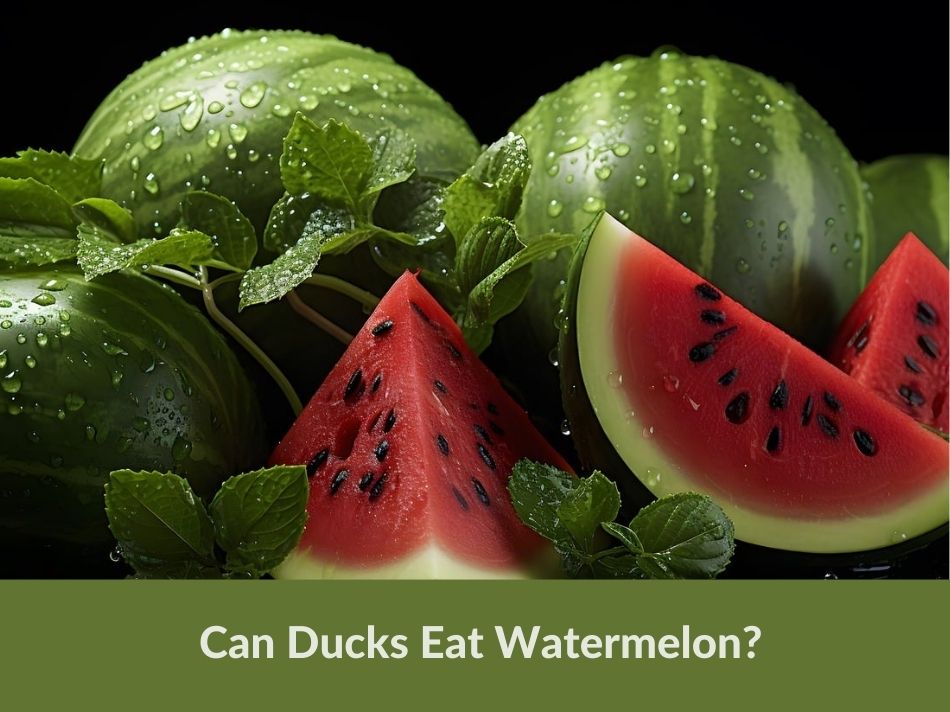Ducks are omnivorous birds that eat a diverse range of foods, including insects, grains, fruits and vegetables. They are also opportunistic foragers that will eat plants, small fish and even animals such as small crabs. But, can ducks eat watermelon?
Yes, ducks can eat watermelon since it contains mostly water, but also several healthy vitamins and minerals that can improve their overall health. Make sure to feed ducks watermelon in moderation and should only be given as an occasional treat.
In this article I’ll take a deep dive into the subject of feeding ducks watermelon. We’ll go over the great health benefits, how to feed them and some more information about the nutritional value.
How Often Can I Feed My Ducks Watermelon?
Feeding ducks watermelon can be a refreshing and enjoyable treat for them, but it’s important to do so in moderation. A general rule is to not give ducks more treats than 10% of their overall diet. You can feed your ducks watermelon once to twice a week and it a great way keep them hydrated.
Can Ducklings Eat Watermelon?
Yes, ducklings can eat watermelon. It’s a great treat that consists mostly of water, but also some healthy vitamins and minerals that can be beneficial for ducklings. It’s important to introduce treats to ducklings that are 4 weeks old or older.
A ducklings diet is very important and watermelon should never replace a proper meal for them. They grow fast and they need a proper nutritious diet to be able to do so. Make sure to cut the watermelon into smaller chomps and keep an eye on them while they eat to make they don’t choke.
Watermelon Nutritional Value
Below is the nutritional value of 100 grams watermelon.
- Calories: 30
- Water: 91%
- Protein: 0.6 grams
- Carbs: 7.6 grams
- Sugar: 6.2 grams
- Fiber: 0.4 grams
It also contains several vitamins and minerals as listed below.
- Vitamin C
- Potassium
- Copper
- Vitamin B5
- Vitamin A
[Source]
Is Watermelon Healthy for Ducks?
Yes, watermelon is very healthy for ducks and is a great way to keep them hydrated since it contains mostly water. It’s actually a great source of several vitamins and mineral that is key for their overall health. I’ve listed some of the benefits of consuming these vitamins below.
- Vitamin C plays a role in boosting the immune system, helping ducks fend off infections and illnesses.
- Potassium is important for hearth health, muscle function and to maintain a proper fluid balance.
- Copper is a great mineral to help the ducks with it’s immune system, iron absorption and is an important pigment for their feathers.
- Vitamin B5 is involved in the metabolism of carbohydrates, fats, and proteins, providing ducks with the energy needed for their daily activities. It can also be beneficial for their feather health, and nervous system.
- Vitamin A is important for proper growth, development, and reproduction in ducks. It also helps them with eye vision and their feather health.
How To Feed Watermelon To Ducks
Feeding ducks watermelon can be a delightful experience, adding a touch of variety to their diet while offering hydration. Below is a small guide on how to feed your ducks watermelon.
- Make sure to feed them ducks watermelon in ponds, lake or river. If you don’t have that environment close then make sure to also give them clean water while they eat.
- Only choose ripe watermelon and cut it into smaller, manageable pieces.
- It’s safe for them to also eat the seeds.
- Watch and enjoy the ducks eat watermelon and listen to their happy quacks.
More Fruit Ducks Can Eat
Ducks are opportunists and will eat pretty anything and fruit is definitely on their list of treats they want to eat. Below are some more fruits that ducks loves to eat.
Remember to view our complete list of duck-friendly fruits.
Conclusion
The primary rule when feeding ducks watermelon or any treats is to prioritize their health and well-being through moderation and a diverse diet. Watermelon is a suitable treat for ducks due to its high water content and beneficial vitamins and minerals.
Disclaimer: The information in this article is for informational purposes only. I'm not an expert or a veterinarian.


